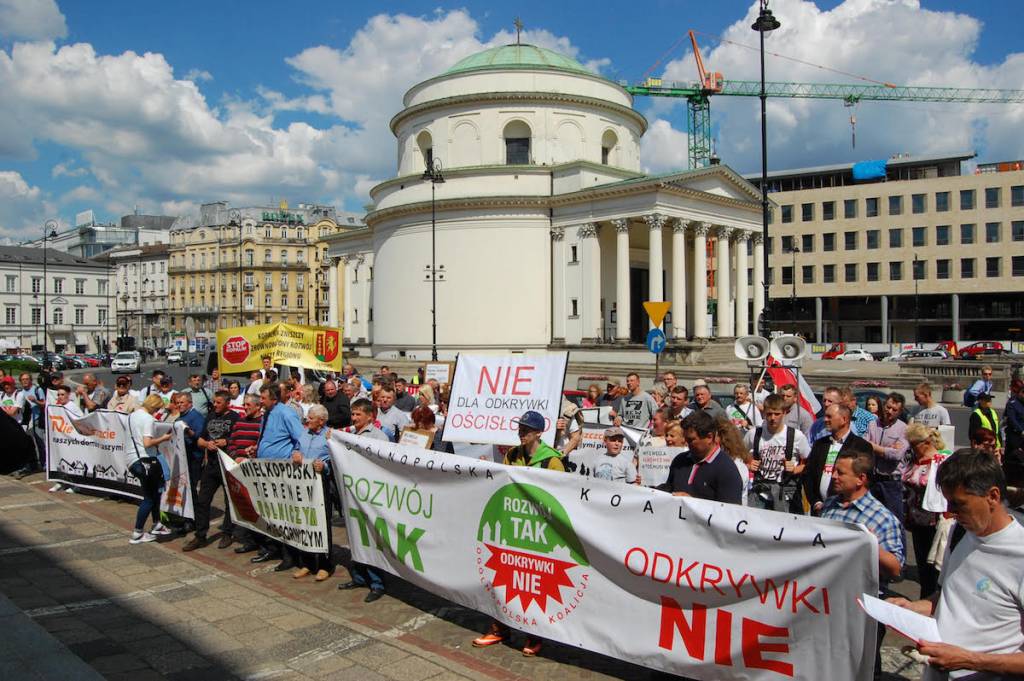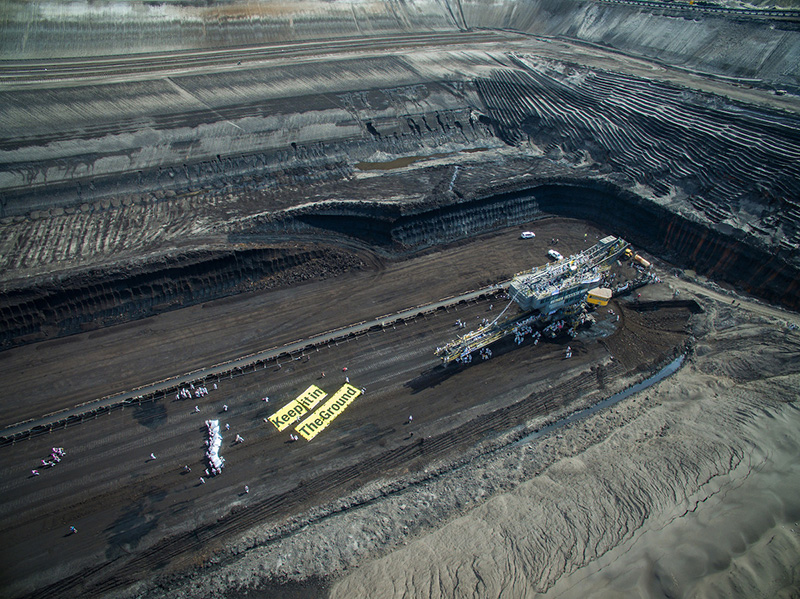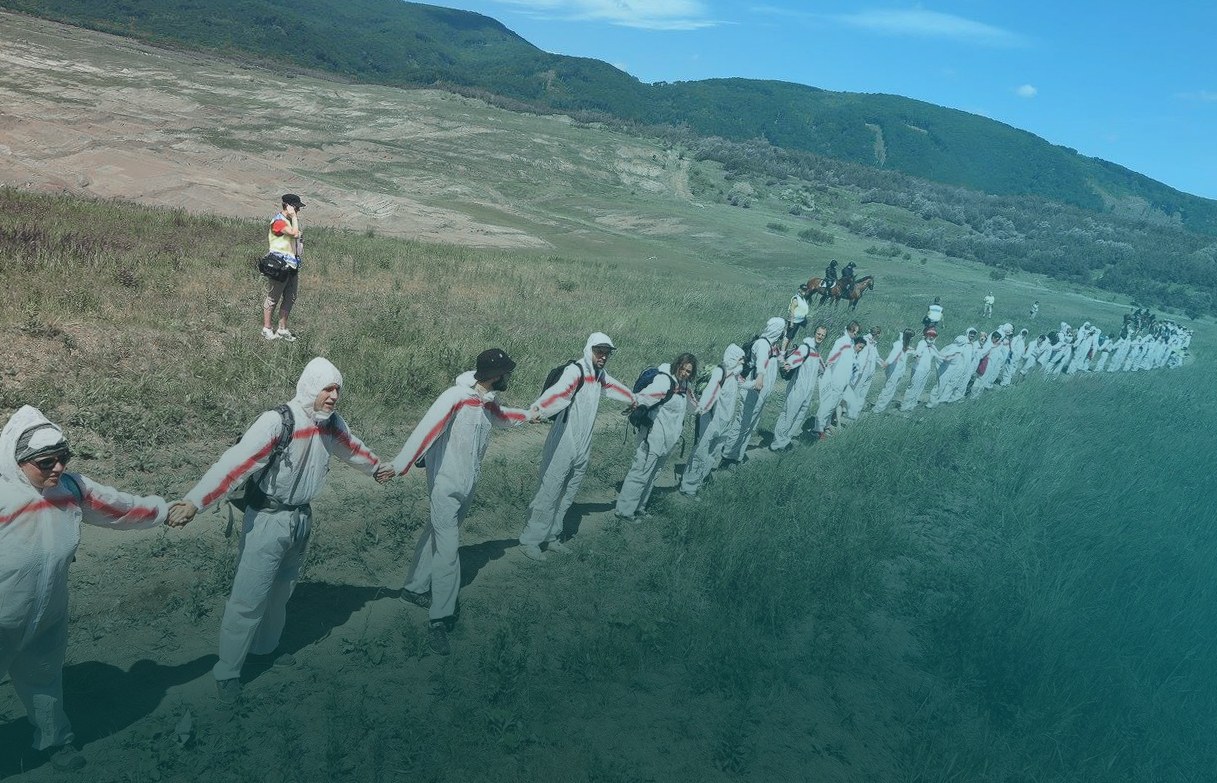350
Scientists warn that we need to phase out fossil fuels urgently to bring down emissions by 2020 and avoid irreversible climate chaos. Yet governments continue to support new fossil fuel projects both politically and financially.
All over Europe, coal mines and power plants, fracking wells and gas pipelines are facing resistance. These fights are led by grassroots groups and local communities determined to stop the projects in their tracks.
This short video features some of the key fossil fuel fights in Europe’s growing climate justice movement.
The EU’s new flagship gas infrastructure under attack
The EU is planning to massively expand gas infrastructure with new mega-pipelines, even though existing gas reserves blow our carbon budget already. New pipelines like the Southern Gas Corridor, Nord Stream 2 and Midcat threaten to lock us into another generation of fossil fuels, and the methane emissions are also known to have a strong warming effect.
But everywhere that pipelines and new fossil fuels are planned, the resistance is growing. From Italy to Spain to Sweden, communities are coming together to stand up against the projects and protect their homes and their livelihoods.
 The Trans Adriatic Pipeline (TAP)
The Trans Adriatic Pipeline (TAP)

The towns of Melendugno and San Foca in southern Italy, are on the frontlines of the battle to stop the Trans Adriatic Pipeline (TAP), which receives funding from the European Investment Bank. As part of the Southern Gas Corridor, TAP is planned to carry billions of cubic metres of gas from Azerbaijan to Italy every year.
The locals have put up strong peaceful resistance against the pipeline construction, despite police violence and even Mussolini-era law that placed the entire town of Melendugno under military lockdown. The pipeline construction is currently on halt over the tourism season and is expected to resume in October.
The local community is preparing to continue resisting the construction despite the threat of horrendous fines. Under the banner ‘No TAP. Not here. Not anywhere’ they express their solidarity with frontline communities along the pipeline route such as farmers resisting TAP in Greece.
 The Midcat Pipeline
The Midcat Pipeline
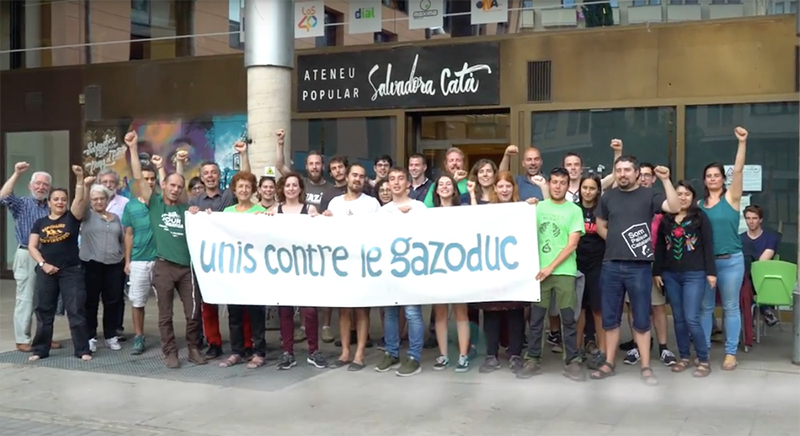 The Midcat pipeline between Spain and France faces community resistance on both sides of the Pyrenees. The first 86-km stretch of the pipeline was built in Catalonia in 2012. Local groups are now building up opposition in towns and villages around Girona along the planned pipeline route to stop it from going ahead. They have joined forces across the border with French groups that have already been struggling against various imposed transnational infrastructure projects that don’t benefit the local communities. There are concerns about the climate impacts, massive environmental destruction and lack of transparency surrounding the project.
The Midcat pipeline between Spain and France faces community resistance on both sides of the Pyrenees. The first 86-km stretch of the pipeline was built in Catalonia in 2012. Local groups are now building up opposition in towns and villages around Girona along the planned pipeline route to stop it from going ahead. They have joined forces across the border with French groups that have already been struggling against various imposed transnational infrastructure projects that don’t benefit the local communities. There are concerns about the climate impacts, massive environmental destruction and lack of transparency surrounding the project.
The pipeline would more than double the amount of gas that can be transferred from Spain to France, even though existing pipelines across the Pyrenees are already under-used. Experts question the economic viability of the project.
Midcat could bring fracked gas from Algeria to Europe. French oil and gas major Total is the biggest fracker in Algeria. While fracking is banned in France, Total’s operations in the former French colony threatens a crucial aquifer in the arid area and faces strong public resistance.
 LNG terminals in Sweden
LNG terminals in Sweden
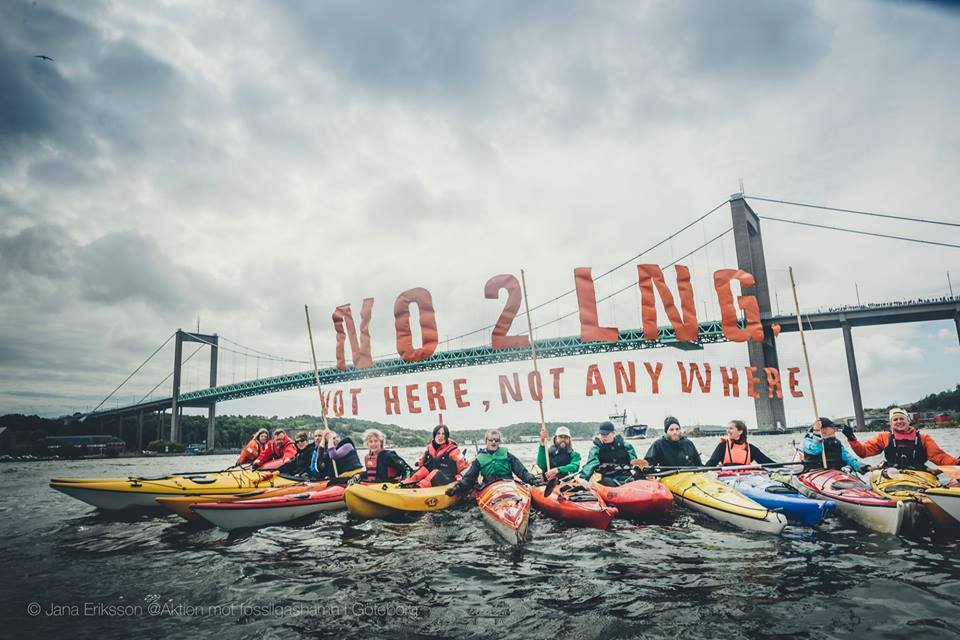
Photo: Jana Eriksson
GO4LNG is a fossil gas terminal being planned in Scandinavia’s largest port in Gothenburg, Sweden. The future of the project is not as certain anymore as resistance is growing in the city and in the Swedish environmental movement.
Since the group ‘Fossilgasfällan’ have been organising campaigns, events and actions against the project, politicians and scientists have started joining the debate against fossil gas. The concern is that the project would lead to large fossil gas imports and that it will trap Sweden in a long term dependence on yet another fossil fuel.
The terminal is the first of eight terminals being planned along the coast of Sweden, as the company Swedegas tries to market this as a climate solution – despite what climate science tells us. This comes as no surprise as the two companies owning Swedegas are Fluxys and Enagas who are both major players in the fossil gas expansion taking place elsewhere in Europe.
With strong connections to other gas resistance groups in Europe the local campaign group against GO4LNG are growing the resistance to this project. It’s crucial the terminal is delayed and stopped, as this would impact the rest of the national LNG expansion in Sweden, and destabilise the gas industry’s strives forward. Not here, not anywhere! #NO2LNG
Toppling coal in its last strongholds
Coal generation in Europe is on the decline as coal increasingly struggles to compete with other sources of energy and pollution rules come into force. Over the past five years, coal generation fell by 25% and more and more countries are committing to a phase-out.
Yet coal remains a major source of the EU’s greenhouse gas emissions and toxic air pollution. Germany and Poland account for more than half of the EU’s remaining coal capacity, followed by the Czech Republic as the third biggest coal producer in Europe.
 Coal in Poland
Coal in Poland
Poland, the host of this year’s UN climate talks, is one of Europe’s last strongholds of the coal industry. The country generates about 80% of its electricity from coal and the government still plans to build new coal power plants, even though air pollution from coal combustion is choking Polish cities. There are days when air pollution in Warsaw is worse than anywhere in China. During intense smog episodes in January last year, one of Warsaw’s hospitals reported a 50% spike in patients, while policy officers were given anti-smog masks.
From 18-22 July, the Polish climate movement will organise the first climate camp in the country. The camp will support the increasing local opposition in the lignite mining region around the city of Konin. The local community is hit by heavy air pollution from the coal power plants and heightened water scarcity as the huge open pit mines have caused the water table to drop dramatically. As a result, farmers have seen their crops decline and a 30-kilometre stretch of the Noteć river has run dry.
 Coal in the Czech Republic
Coal in the Czech Republic
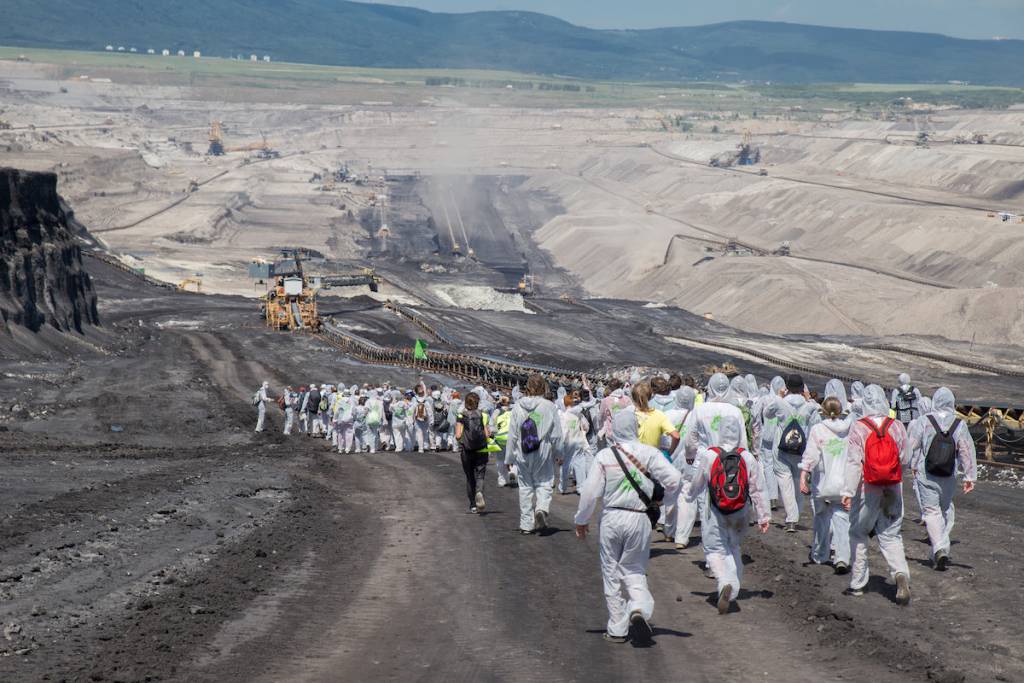
Photo: Ondřej Bratoň
The Czech Republic is at a crossroads. In the next few years, the country’s old coal power plants will either have to be retrofitted or closed down.
The grassroots network Limity jsme my (‘we are the limits’) just mobilised for a climate camp and mass action targeting coal production from 27 June to 1 July. They organise together with frontline groups who organise around local air pollution.
Last year, the group organised the first climate camp in the country and with over a hundred people successfully shut down the country’s largest coal mine for a day, the Bílina brown coal mine in North Bohemia.
 Coal in Germany
Coal in Germany
Despite a massive rise in renewables driven from the bottom-up, Germany is set to miss its climate targets because of its dirty coal mines and power plants. Seven of Europe’s ten biggest polluters are German coal-fired power stations. RWE’s coal operations in the Rhineland are the biggest source of CO2 emissions in Europe.
The Rhineland has also become a focal point for the climate justice movement in Europe. In solidarity with people impacted by climate change around the world, as well as frontline communities and local grassroots groups that resist the destruction of the land and demolition of entire villages, the climate justice coalition Ende Gelände (‘here and no further’) has been organising civil disobedience mass actions that have seen thousands of people disrupt mining operations. For 25-29 October, Ende Gelände have announced their next mass action to put an end to coal mining and protect the old-growth forest Hambach, which is being cleared to make way for the expanding mine.
Cutting off the last stand of the fracking industry
Many countries in Europe have banned and pushed back on fracking, which is a gas extraction method that uses high water pressure and chemicals to crack underground rocks. England is one of the last hopes for the fracking industry.
 Fracking in the UK
Fracking in the UK
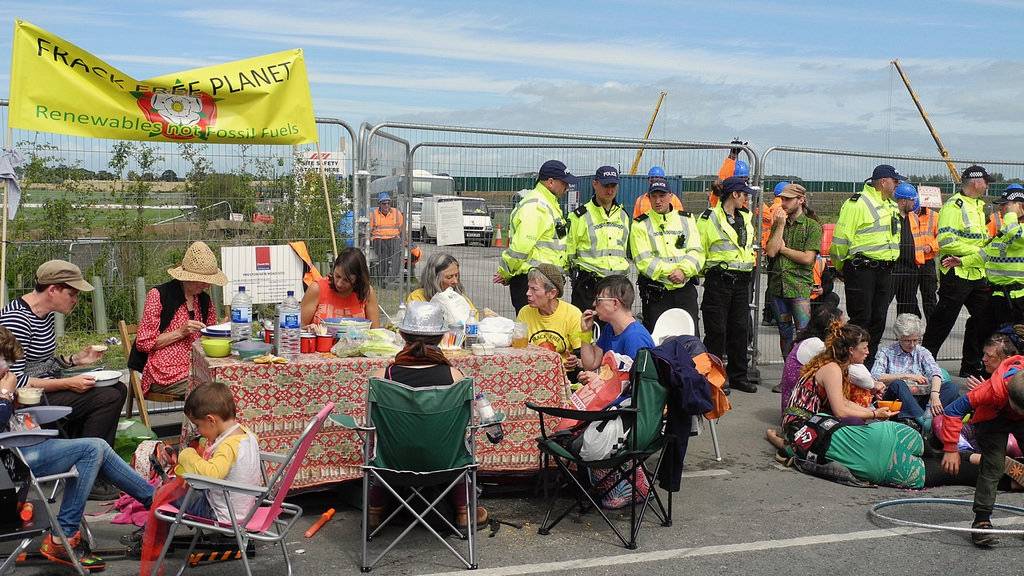
Photo: Reclaim the Power
The UK government has recently put forward a proposal that would allow them to push through fracking developments as a matter of ‘national interest’ that would no longer require planning permission from local councils.
However, the fracking industry encounters persistent protest from community groups at exploratory drilling sites spanning the country. After years of delays, the first commercial fracking since 2011 in the UK is poised to start this year at Preston New Road in Lancashire, where the local council was overruled by central government to make way for Cuadrilla’s fracking plans.
The grassroots anti-fracking network Reclaim the Power announced that it will be going all out this summer to stand alongside local communities resisting fracking. On 28 June, they pulled off a 54-hour mass protest at Cuadrilla’s fracking site at Preston New Road.
Shutting down Europe’s largest gas field
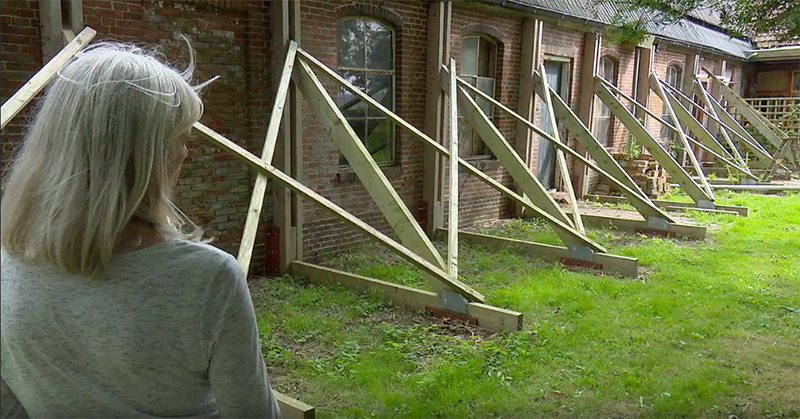
 Gas drilling in the Netherlands
Gas drilling in the Netherlands
Shell and Exxon have been exploiting Europe’s largest gas field near Groningen, in the Netherlands, for the past 55 years, with support from the Dutch government. The drilling has caused over a thousand earthquakes, which has damaged tens of thousands of houses in the area, some have already become uninhabitable.
For decades, the people of Groningen have been fighting for an end to the drilling and compensation for the damage Shell and Exxon caused while raking in the profits. Their protests and worsening earthquakes have led the Dutch government to lower production and announce a phase-out by 2030.
None of this is reason for complacency for the grassroots climate network Code Rood who are mobilising for a mass action and action camp this August. They demand immediate action at the scale the climate crisis demands instead of promises for the far away future, and for Shell and Exxon to be held accountable to the damages they have caused.
We all have a part to play in taking away the fossil fuel industry’s power.
Keep in touch with how you can support these groups wherever you are.
Taking away the fossil fuel industry’s power. Everywhere.
Without political and financial backing, none of these projects can go ahead – and people everywhere are getting together to remove this essential support. More and more people are stepping up in support of these frontline fights to put pressure on the financiers that provide the loans and investments for these climate-wrecking projects. At the same time, groups across the globe are organising in their communities to erode public acceptance of the fossil fuel industry.
These locally distributed campaigns are gearing up for globally coordinated days of action as well:
- On 8 September, groups around the world will Rise for the Climate to put pressure on authorities and institutions locally to build a fossil-free world that works for all.
- On 13 October, groups around the world will take action against gas locally for the Global Gasdown. The mobilisation will target infrastructure as well as the companies and funders behind the projects.
Recent events
- Climate camp and mass action targeting coal mining in the Czech Republic – 27 June to 1 July
- Two weeks of direct actions followed by a 48-hour mass blockade targeting fracking in the UK, 11 June – 30 June
Upcoming events
- Climate camp and protests against coal mining in Poland, 18-22 July
- Climate camp, degrowth summer school and sit-in targeting coal in Germany, 28 July – 5 August
- Climate camp and climate games targeting the oil port in Basel, Switzerland, 3-13 August
- Rhineland climate camp in Germany, 11-22 August
- Camp and mass action targeting gas extraction at Europe’s largest gas field near Groningen, the Netherlands, 21-31 August
- Global day of action ‘Rise for Climate’, 8 September
- Global day of action ‘Global Gasdown’, 13 October
- Mass action targeting coal mining in Germany, 26-28 October
